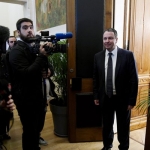Crossing the sea together, yet miles apart
Lille (France) - Any journalist posted to AFP's Lille bureau inevitably cuts their teeth by reporting on the migrants in Calais. Even now, four years after the notorious Jungle camp was dismantled, the first thing that hits you driving into the northern French city are the towering barbed-wire fences along the motorway, meant to stop stowaways on trucks and ferries bound for England. Despite the dangers, tragically highlighted in October when a Kurdish-Iranian family drowned when their boat capsized, the number of those crossing the Channel keeps growing.
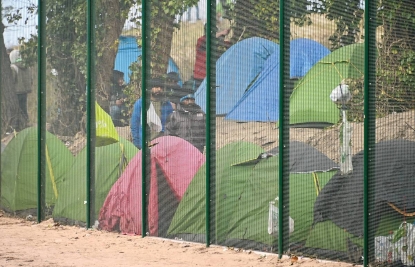 (AFP / Denis Charlet)
(AFP / Denis Charlet)More than 7,000 have attempted it so far this year, five times more than in 2019. But the story of those risking everything in the hope of a better life is too often told just by the latest figures.
That's why for months we'd been discussing doing a more long-term report on the reality behind the data. We'd made several requests to go out with a sea rescue patrol, but they were all turned down. We knew, though, we had to tell this story through a very human perspective.
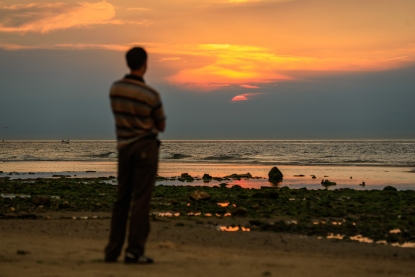 A man watches the sunset as he stands by the beach in the town of Tardinghen, one of the beaches used by migrants in their attempt to cross the Channel, on August 13, 2020 (AFP / Sameer Al-doumy)
A man watches the sunset as he stands by the beach in the town of Tardinghen, one of the beaches used by migrants in their attempt to cross the Channel, on August 13, 2020 (AFP / Sameer Al-doumy)So we began to consider finding a family to follow, from their time on the French coast to their arrival on British soil. With Lille video journalist Thomas Bernardi and Sameer Al-Doumy, a Syrian photographer based in the northern French city of Caen -- whose language skills would prove indispensable for the whole project -- we were in for quite a journey.
Our first port of call was contacting aid groups who suggested we went along to a food distribution in Grande-Synthe, about 40 kilometres (25 miles) from Calais, where lots of Middle Eastern families live. Concerned we might scare some of the migrants off, we deliberately didn't take cameras or video equipment with us.
There, we met Walid, a 29-year-old Kuwaiti, and Falah, in his 50s from Iraq, travelling with his two daughters Arwa and Rawane. They had arrived a week earlier and were all living in a precarious looking tent amid the undergrowth on the side of a rail track.
Rubbish, plastic wrapping and empty tubes littered the ground and they warmed up the donated food, mostly rice, on a blackened stove left behind by previous occupants. Sipping black tea together, we put our idea to them, and after a long discussion in Arabic, they agreed to allow us to shadow them and be filmed.
This first meeting, though friendly, was still quite reserved and we knew we would need to break the ice somehow. The two men told us that the crossing was imminent and their smuggler was due to be in touch by the end of the week. As they waited, we waited too.
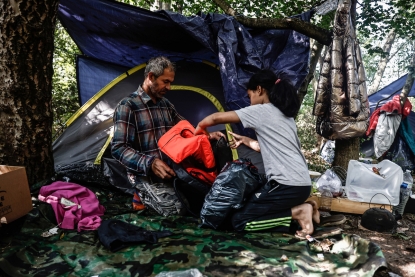 (AFP / Sameer Al-doumy)
(AFP / Sameer Al-doumy)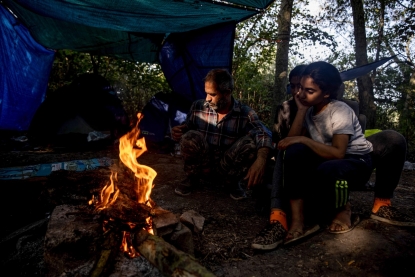 (AFP / Sameer Al-doumy)
(AFP / Sameer Al-doumy)
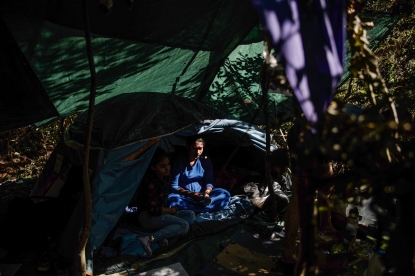 Rawane, in the makeshift migrants camp in Dunkirk, northern France, on September 2, 2020.
Rawane, in the makeshift migrants camp in Dunkirk, northern France, on September 2, 2020.The time was spent collecting firewood, jostling for food aid at the handouts, washing clothes or bathing in a nearby canal. Walid, with pitch-black hair and three days' growth of beard, was chattier than his travelling companion, who was reserved and worried, mostly concerned about his eldest daughter's diabetes. Every day was a race to track down insulin from doctors and NGOs. In the morning, sharing our breakfast with them, we ate croissants in front of the tent, the chat chit becoming a bit hard going at times. But simple moments like these helped to gradually build up trust.
We tried to know more about their lives and what was driving them towards England. Like thousands of others, they seemed sure that work would be easier to find there.
Throughout it all, 10-year-old Arwa had a constant smile on her face, almost as if she was living in a little bubble. At one point, she mischievously even tried out our camera which helped pass the time, especially given the lack of toys around. But it suddenly hit us; in a few short hours, she could well be being tossed about by the waves somewhere in the middle of the Channel.
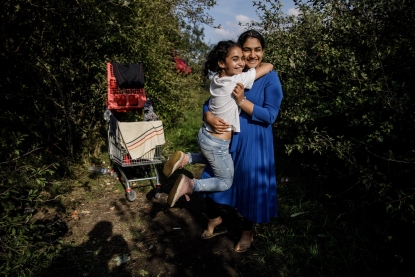 (AFP / Sameer Al-doumy)
(AFP / Sameer Al-doumy)At night when the weather was fine we went over to the beaches at Calais, Sangatte and Escalles. The sand dunes were strewn with discarded clothes, bedding or shoes left behind by migrants. We also saw police who confirmed that crossing attempts were under way -- nighttimes are a real game of cat and mouse between the police, migrants and smugglers.
We needed a plan for how we were going to accompany Walid and Falah across the water. The idea of making the crossing with them was a non-starter. For us, the notion of helping finance a criminal network by forking out several thousand euros to be taken across the Channel was out of the question. We had to find our own boat. But one after another, the fishermen that we asked turned us down. Many feared it would just cause them problems. One boat hire guy even laughed in our faces, telling us to give up.
"Drop it! It's not worth it, you won't find anyone," he said.
We scoured the bars that are regular haunts for fishermen and sailors. And at the beginning of September, after three days of tough negotiation, we managed to find a little boat, with two hardened old sea dogs for our captains. The stars seemed aligned: Walid told us the crossing was set for that evening. We were all geared up, but, as it turned out, for nothing -- dejected, the migrants came back at dawn. There had been too many police around.
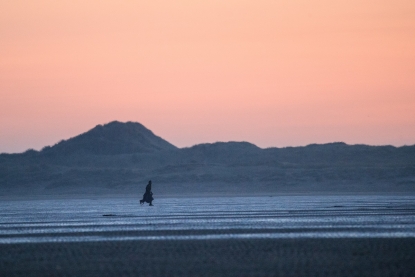 (AFP / Sameer Al-doumy)
(AFP / Sameer Al-doumy)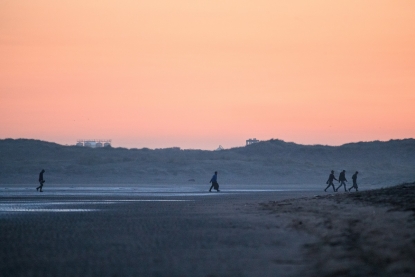 (AFP / Sameer Al-doumy)
(AFP / Sameer Al-doumy)After the false start and having been up all night, we felt frustrated and a bit down at having to go back to square one. We worried the story wasn't going to work out. But we quickly realised too that our emotions were nothing compared to those of the migrants, for whom everything was at stake. Again, we waited.
"Tomorrow, inshallah," Walid's intermediary said, every day on the phone. Days passed. Walid got impatient and decided to change smugglers. Since Falah had already paid his in advance, he had to stick with the same one, and after months together, the two men parted ways.
We only managed to glean fragments about their previous lives. Falah fled Iraq in 2015 when the Islamic State militant group was advancing. From Karbala, he went on foot to Turkey, Greece, North Macedonia and Croatia, part of the massive influx of migrants into Europe. After two years in Germany, he thought he'd found a new home but the failure of his asylum requests forced him back on the road.
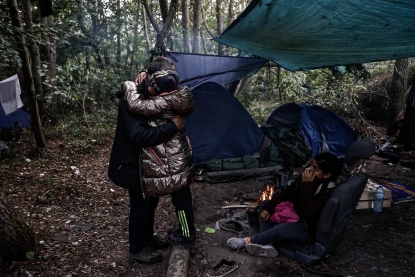 (AFP / Sameer Al-doumy)
(AFP / Sameer Al-doumy)
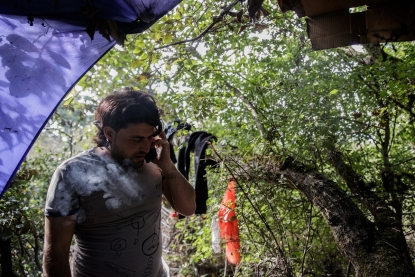 Walid, le 4 septembre 2020 (AFP / Sameer Al-doumy)
Walid, le 4 septembre 2020 (AFP / Sameer Al-doumy)
Walid, who left in 2018, is from the stateless Arab bidoon minority in Kuwait. He also travelled through Greece and was disappointed by the European Union, which "gives you nothing and ends up expelling you", he said.
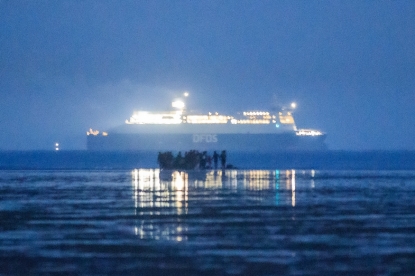 Migrants including families embark on the beach of Gravelines as a ferry of the Danish shipping company DFDS sails in the Channel (Manche), near Dunkirk, northern France on September 22, 2020. (AFP / Sameer Al-doumy)
Migrants including families embark on the beach of Gravelines as a ferry of the Danish shipping company DFDS sails in the Channel (Manche), near Dunkirk, northern France on September 22, 2020. (AFP / Sameer Al-doumy)Finally, the day arrived. That afternoon, groups left the camp at Grande-Synthe carrying rubbish bags hiding their life jackets. They headed to the bus stop and waited. We boarded our boat at 9:00 p.m. and spent the night moored offshore to make sure we didn't miss them setting off. Walid's group was hidden between the dunes and shrubs.
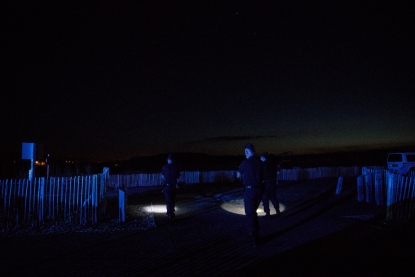 Les forces de l'ordre patrouillent sur la plage de Sangatte, dans le nord de la France, le 1er septembre 2020 (AFP / Sameer Al-doumy)
Les forces de l'ordre patrouillent sur la plage de Sangatte, dans le nord de la France, le 1er septembre 2020 (AFP / Sameer Al-doumy)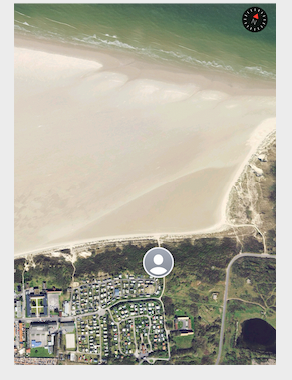
The beams from the gendarmes' lights swept along the beach, barely metres from where the group was waiting for the smuggler. Thanks to the information sent by Walid on WhatsApp, we saw the migrants begin to move. At about 7:00 a.m. the signal was given and their boat launched into the water.
We watched them get closer as dawn broke, until we could make out about 15 people, including women and children, in the inflatable. Even from a distance we could see signs of worry on some of their faces, although no one looked alarmed. In fact we were struck by how calm they appeared, some even smiling as the little boat skimmed along at five kilometres an hour (three miles an hour). At that point, their only concern was the engine cutting out.
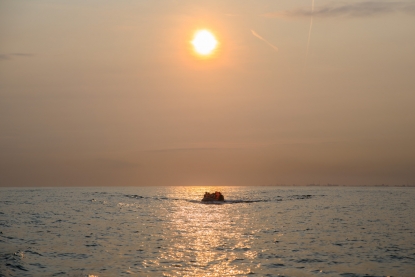 11 septembre 2020, le départ (AFP / Sameer Al-doumy)
11 septembre 2020, le départ (AFP / Sameer Al-doumy)Once at sea, the authorities' priority is safeguarding human life. They won't try to stop a boat as any seabound intervention could lead to an accident and cause migrants who can't swim to jump into the water. They only intervene if a vessel gets into trouble. We kept a distance close enough to be able to report on their crossing -- knowing that, at the slightest sign of a problem, we would radio the rescue patrol. From time to time, Walid waved or gave us a thumbs up to indicate everything was OK. The sea was unusually calm.
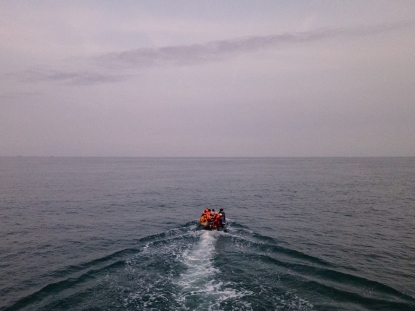 11 septembre 2020, le départ (AFP / Sameer Al-doumy)
11 septembre 2020, le départ (AFP / Sameer Al-doumy)At around 10:00 a.m., the boat crossed the invisible maritime border separating the territorial waters of France from those of Britain. Arms stretched to the sky, Walid and the group were jubilant. After three hours at sea, between the cargo ships and the ferries, even some dolphins and a seal, we felt quite emotional seeing him sail off. Would a kinder future be in store in Britain? We weren't convinced, unfortunately. It was time for us to turn back, but the story wasn't over.
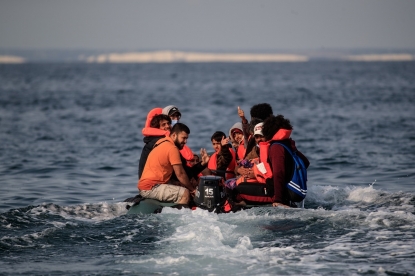 (AFP / Sameer Al-doumy)
(AFP / Sameer Al-doumy)On the other side of the Channel, at Dover, an AFP team from the London bureau had travelled to the coast to film Walid's arrival. Via a WhatsApp group we created, we sent them our last location and a description of how to recognise Walid's boat among the others arriving that day. The migrants disembarked three hours later, exhausted but happy, and were immediately taken into the care of the British authorities. We heard indirectly that Falah, too, managed to cross with his girls. Walid got back in touch with us from a holding centre, north of London, where he stayed for four days before being transferred to a "comfortable" hotel as he waited out the procedure of requesting asylum.
We returned to Lille and began going through three weeks' worth of material and images, feeling a strong sense of how lucky we are to live in a peaceful, prosperous and democratic country.
Authors: Clément Melki, Thomas Bernardi and Sameer al-Doumi. Translated and edited by Kate Millar.



